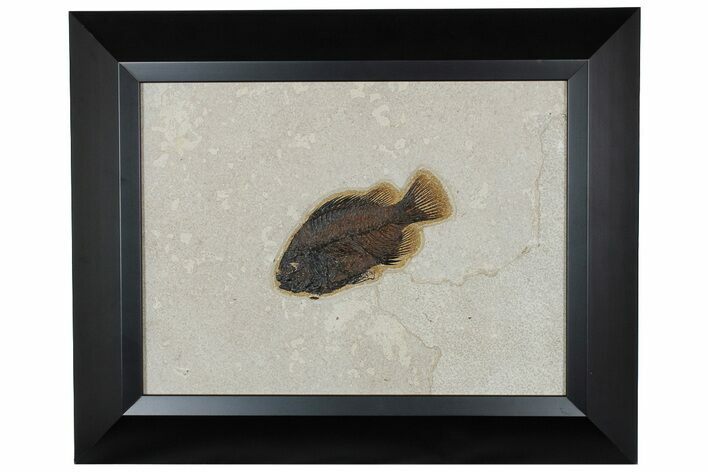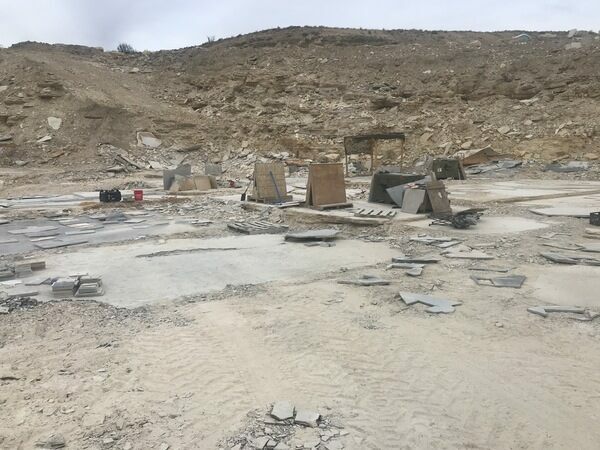This Specimen has been sold.
5.1" Framed Fossil Fish (Cockerellites) - Wyoming
This is a fossil fish (Cockerellites) from the famous 18-inch layer of the Green River Formation. It's 5.1" long and was collected this past year at the Fossil Lake Safari Quarry near Kemmerer, WY. This amazing specimen is an incredibly well preserved on a slab of shale that has been framed for easy hanging and display. It beautifully shows bone and fin rays.
About Cockerellites
Cockerellites liops is a species of extinct temperate bass found in the Eocene aged Green River Formation of Wyoming. It is characterized by a sunfish-like body and its stout dorsal and anal spines. It was originally placed in the Priscacara genus but was moved to the newly created genus Cockerellites by D. Jordan and H. Hanibal in 1923. There is still some debate among researchers about whether this new genus is valid.
Cockerellites is found in large numbers in mid-lake deposits, representing 5 to 20 percent of the fish unearthed, depending on the layer. It is considerably rarer in shoreline deposits, representing only 1 to 2 percent of the fish found. Because of this, Cockerellites is thought to have been a schooling fish. Fossils have been found at a maximum size of about six inches, but they rarely exceed five inches in length.
At first glance, Cockerellites liops has a very similar appearance to the rarer species Priscacara. Size can often be used as a differentiator, since Cockerellites did not exceed 6 inches while Priscacara serrata is typically found in excess of 6 inches. Cockerellites also has more dorsal and anal fin rays than Priscacara and a much smaller mouth.
Cockerellites liops is a species of extinct temperate bass found in the Eocene aged Green River Formation of Wyoming. It is characterized by a sunfish-like body and its stout dorsal and anal spines. It was originally placed in the Priscacara genus but was moved to the newly created genus Cockerellites by D. Jordan and H. Hanibal in 1923. There is still some debate among researchers about whether this new genus is valid.
Cockerellites is found in large numbers in mid-lake deposits, representing 5 to 20 percent of the fish unearthed, depending on the layer. It is considerably rarer in shoreline deposits, representing only 1 to 2 percent of the fish found. Because of this, Cockerellites is thought to have been a schooling fish. Fossils have been found at a maximum size of about six inches, but they rarely exceed five inches in length.
At first glance, Cockerellites liops has a very similar appearance to the rarer species Priscacara. Size can often be used as a differentiator, since Cockerellites did not exceed 6 inches while Priscacara serrata is typically found in excess of 6 inches. Cockerellites also has more dorsal and anal fin rays than Priscacara and a much smaller mouth.
About The 18 Inch Layer Of Fossil Lake
Specimens like this come from the coveted 18 inch layer of the Green River Formation, which produces darker and more detailed fish than the majority on the market. The rock from this layer is much harder and more durable than other layers in the formation, likely due to its initial deposition conditions in deep water. Because of these conditions, fish found in the 18-inch layer can be extracted whole and in excellent condition. This layer is typically collected at night using low-angle light to see the bump in the rock that the fish's backbone creates. They then cut these fish out and take them to a lab where the fish, which may be up to an inch under the surface of the rock, are meticulously extracted under microscope with hand tools.
Specimens like this come from the coveted 18 inch layer of the Green River Formation, which produces darker and more detailed fish than the majority on the market. The rock from this layer is much harder and more durable than other layers in the formation, likely due to its initial deposition conditions in deep water. Because of these conditions, fish found in the 18-inch layer can be extracted whole and in excellent condition. This layer is typically collected at night using low-angle light to see the bump in the rock that the fish's backbone creates. They then cut these fish out and take them to a lab where the fish, which may be up to an inch under the surface of the rock, are meticulously extracted under microscope with hand tools.
SPECIES
Cockerellites (Priscacara) liops
LOCATION
Fossil Safari Quarry, Kemmerer, Wyoming
FORMATION
Green River Formation
SIZE
5.1" fish, 15.5 x 12.5" in frame
CATEGORY
SUB CATEGORY
ITEM
#177301
We guarantee the authenticity of all of our specimens.
 Reviews
Reviews













